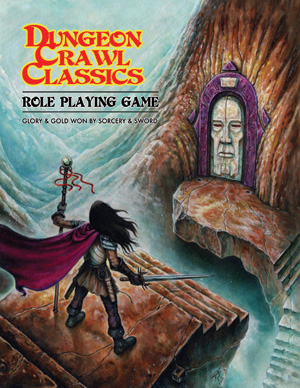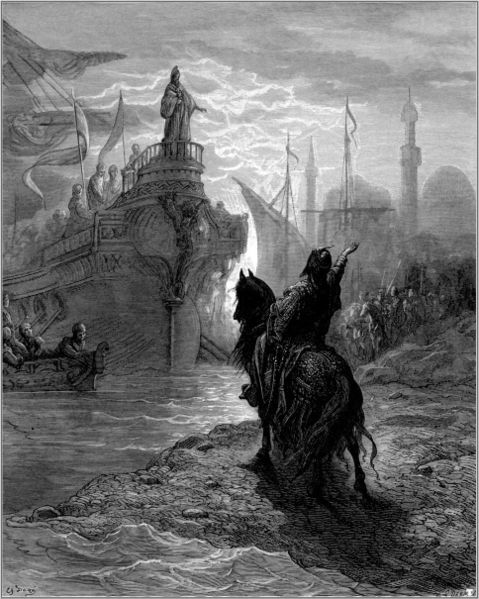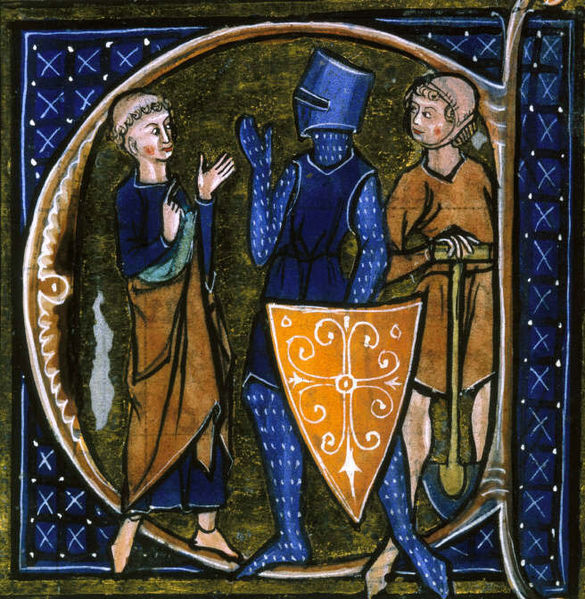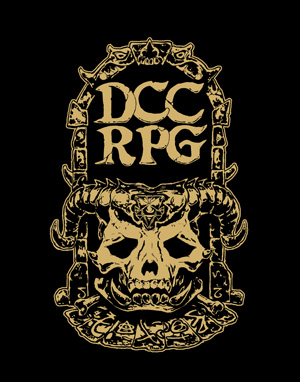 We have reached the fourth installment of my weekly series taking a closer look at the Dungeon Crawl Classics RPG character classes. So far I have looked at the Warrior, the Thief, and the Dwarf. This week I opened up voting to readers of the blog, the Google+ community and Twitter as to which character class I would be looking at. I suspected the Wizard would win, but it seems folks want to read about the Cleric! So this week we take a closer look at the Cleric character class.
We have reached the fourth installment of my weekly series taking a closer look at the Dungeon Crawl Classics RPG character classes. So far I have looked at the Warrior, the Thief, and the Dwarf. This week I opened up voting to readers of the blog, the Google+ community and Twitter as to which character class I would be looking at. I suspected the Wizard would win, but it seems folks want to read about the Cleric! So this week we take a closer look at the Cleric character class.
The Class
The Dungeon Crawl Classics cleric draws his or her power from their god as a reward for their service to their deity. In DCC RPG The Old Ones established Law and Chaos which the gods fall under. The cleric follows his god, seeking to find relics and do battle with enemies of the faith or the beliefs of law or chaos.
A cleric gets a d8 for their hit dice. Their weapon training varies depending on which deity they worship, a chart is included that shows which weapons the followers of a specific deity use. A cleric can wear any type of armor.
The cleric’s deity is chosen at first level. The alignment of the cleric must match that of the deity they select. With three alignments in DCC RPG the cleric can choose to follow the path of Law, Chaos or Neutral. The cleric following the neutral path seeks a path of balance.
Clerics call upon their god for their magic. If the cleric is in good standing with their god and their god hears their request for divine aide and they approve of the request the cleric can cast their spell. Mechanically this is handled through a spell check. Roll a d20, add a couple of modifiers and check the chart that goes with the spell you are casting. A successful spell check means the spell is successful and your god grants you the aide through the spell.
There are some additional rules for cleric magic. A natural 1 on your spell check roll results in disapproval. This results in the spell being cast failing and a roll on a disapproval table. The disapproval table contains various results. These results typically are penalties or penalties until atonement has been achieved.
If a cleric fails their spell check roll, this increases the chance for a disapproval. For example, if a spell check is failed the cleric character now will need to roll on the disapproval table if they roll a 1 or a 2 on the d20 spell check. If they fail another spell check later in the same day then the disapproval chance increases to a 1, 2, or 3 on the d20 and so on and so on. A night’s rest will reset the disapproval chance back to a natural 1 on a d20.
 A cleric can offset an increasing disapproval rating through a sacrifice to their deity. A cleric could also see a more rapid increase in their disapproval number if their deity perceived them doing something sinful or against the god’s beliefs.
A cleric can offset an increasing disapproval rating through a sacrifice to their deity. A cleric could also see a more rapid increase in their disapproval number if their deity perceived them doing something sinful or against the god’s beliefs.
A cleric also has a Turn unholy ability which is essentially another spell check to turn unholy creatures. There is a rather extensive chart to help adjudicate this check. A cleric can fail this check and increase their disapproval as well.
The cleric also has the ability to lay on hands to provide healing to other party members. The lay on hands mechanic is a bit complex with several variables to it. It requires a spell check to determine how many possible hit dice the cleric can roll to heal. This value is affected by whether you are healing someone of like alignment. If the cleric tries to heal someone to an adjacent alignment then the penalty is not as great. To heal someone of opposed alignment reduces the number of dice rolled further and generates sin for the cleric. Lay on hands also can allow a cleric to heal conditions instead of hit points.
Clerics also have an ability to seek out divine aide. This is aide above and beyond what they can already tap into through their spells and lay on hands ability. This check is made against a DC and imposes a significant penalty on the disapproval rating for future spell checks. Seeking divine aide is not to be taken lightly.
My Impression
As is readily evident by just the length the class description above, there is a lot going on with the DCC RPG cleric. Spells, lay on hands, the importance of alignment and how that affects various things can be a lot to grasp. Most of the class works around a series of spell checks for the various abilities which does help keep things straight. It is just a matter of getting used to what the cleric can do and how alignment may or may not affect certain abilities and keeping the disapproval mechanic in the back of your mind.
 I like how alignment matters and has a mechanical aspect. A lawful cleric has an actual penalty for healing a chaotic party member in that the healing is less effective and they will be committing a sin in their god’s eyes. I suspect this will either lead to great roleplaying or we will see a lot of neutral clerics in play.
I like how alignment matters and has a mechanical aspect. A lawful cleric has an actual penalty for healing a chaotic party member in that the healing is less effective and they will be committing a sin in their god’s eyes. I suspect this will either lead to great roleplaying or we will see a lot of neutral clerics in play.
Another possibly overlooked item that I like about the cleric is in the caster level section. There it states caster level is generally the cleric level. But it leaves the door wide open for quests for the cleric to find items or other means to increase their caster level. I think this is great and just a rather pointed example that if you or your players don’t like how something work in the DCC RPG game, develop a quest for that character to break some barrier you see the rules putting forth.
In actual game sessions I have run one where a cleric was present and another where a cleric was not. The party with the cleric certainly had an easier time, still tough, but at least there was some means of adventuring on. The party that did not have a cleric was pretty beat up by the end of the adventure. DCC RPG certainly seems to be a game where having a cleric along is of great benefit, though not necessarily required.
The cleric in DCC RPG once again does a great job representing what a cleric “should” feel like to me. Alignment matters, they have the ability to heal multiple times per day and can have a slightly different feel based on the deity they choose to follow.
Next Week
This week’s character in-depth look was decided by the readers of this blog via feedback from comments here, Twitter and Google+. Once again I am leaving it up to readers of The Iron Tavern to vote for which class they would like to see me look at next. I have covered the Warrior, Thief, Dwarf and now the Cleric.
Which character class should I look at next? Post a comment here, on Google+ or Twitter!
 Over the past several weeks The Iron Tavern has been taking a close look at each of the character classes in Dungeon Crawl Classics RPG. I primarily did the series with intent of highlighting some of the class features and some of my own thoughts for those on the fence about the game or just curious about the classes it offers. A secondary benefit was to give me a more structured way of taking a look at each character class to improve my judging in DCC RPG games. Overall I am pretty happy with how the series turned out.
Over the past several weeks The Iron Tavern has been taking a close look at each of the character classes in Dungeon Crawl Classics RPG. I primarily did the series with intent of highlighting some of the class features and some of my own thoughts for those on the fence about the game or just curious about the classes it offers. A secondary benefit was to give me a more structured way of taking a look at each character class to improve my judging in DCC RPG games. Overall I am pretty happy with how the series turned out.


